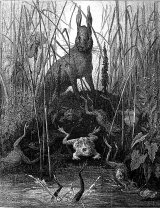The Hare and the Frogs
"The Hare and the Frogs" is a fable by Jean de La Fontaine that uses animals to deliver a message about perspective and fear. In the story, a frightened hare disturbs a gathering of frogs while running from an unknown threat. Seeing the frogs scatter in fear makes the hare realize that there might always be someone more afraid than you are. Thus, the book teaches the lesson that fears are often relative and can be exaggerated by our perceptions.
One day sat dreaming in his form a Hare, (And what but dream could one do there?) With melancholy much perplexed (With grief this creature's often vexed). "People with nerves are to be pitied, And often with their dumps are twitted; Can't even eat, or take their pleasure; Ennui," he said, "torments their leisure. See how I live: afraid to sleep, My eyes all night I open keep. 'Alter your habits,' some one says; But Fear can never change its ways: In honest faith shrewd folks can spy, That men have fear as well as I." Thus the Hare reasoned; so he kept Watch day and night, and hardly slept; Doubtful he was, uneasy ever; A breath, a shadow, brought a fever. It was a melancholy creature, The veriest coward in all nature; A rustling leaf alarmed his soul, He fled towards his secret hole. Passing a pond, the Frogs leaped in, Scuttling away through thick and thin, To reach their dark asylums in the mud. "Oh! oh!" said he, "then I can make them scud As men make me; my presence scares Some people too! Why, they're afraid of Hares! I have alarmed the camp, you see. Whence comes this courage? Tremble when I come; I am a thunderbolt of war, may be; My footfall dreadful as a battle drum!" There's no poltroon, be sure, in any place, But he can find a poltroon still more base.
Translation
Translate and read this book in other languages:
Select another language:
- - Select -
- 简体中文 (Chinese - Simplified)
- 繁體中文 (Chinese - Traditional)
- Español (Spanish)
- Esperanto (Esperanto)
- 日本語 (Japanese)
- Português (Portuguese)
- Deutsch (German)
- العربية (Arabic)
- Français (French)
- Русский (Russian)
- ಕನ್ನಡ (Kannada)
- 한국어 (Korean)
- עברית (Hebrew)
- Gaeilge (Irish)
- Українська (Ukrainian)
- اردو (Urdu)
- Magyar (Hungarian)
- मानक हिन्दी (Hindi)
- Indonesia (Indonesian)
- Italiano (Italian)
- தமிழ் (Tamil)
- Türkçe (Turkish)
- తెలుగు (Telugu)
- ภาษาไทย (Thai)
- Tiếng Việt (Vietnamese)
- Čeština (Czech)
- Polski (Polish)
- Bahasa Indonesia (Indonesian)
- Românește (Romanian)
- Nederlands (Dutch)
- Ελληνικά (Greek)
- Latinum (Latin)
- Svenska (Swedish)
- Dansk (Danish)
- Suomi (Finnish)
- فارسی (Persian)
- ייִדיש (Yiddish)
- հայերեն (Armenian)
- Norsk (Norwegian)
- English (English)
Citation
Use the citation below to add this book to your bibliography:
Style:MLAChicagoAPA
"The Hare and the Frogs Books." Literature.com. STANDS4 LLC, 2025. Web. 6 Mar. 2025. <https://www.literature.com/book/the_hare_and_the_frogs_2494>.








Discuss this The Hare and the Frogs book with the community:
Report Comment
We're doing our best to make sure our content is useful, accurate and safe.
If by any chance you spot an inappropriate comment while navigating through our website please use this form to let us know, and we'll take care of it shortly.
Attachment
You need to be logged in to favorite.
Log In